ACC204 Corporations Law: Applying Legal Principles to Case Studies
VerifiedAdded on 2023/06/12
|7
|1277
|143
Report
AI Summary
This assignment consists of two problem-based questions addressing key issues in Corporations Law. The first question examines whether Liam and Peta can be tried under the Corporation Act 2001 for their roles in an insolvent company, focusing on director responsibilities and potential penalties under sections 588G and 1317E. It applies legal principles concerning corporate solvency and director duties of care and diligence. The second question explores potential actions against Banger Ltd for contracting with Gnosis Records and examines whether the directors of Cloud Tech can take action against Alexandra for using confidential information. It applies the principle of separate corporate existence established in Salomon v Salomon and analyzes breaches of director duties under sections 182 and 183 of the Corporation Act 2001, concluding that while no action can be taken against the new company, Alexandra may face consequences for misusing confidential information.
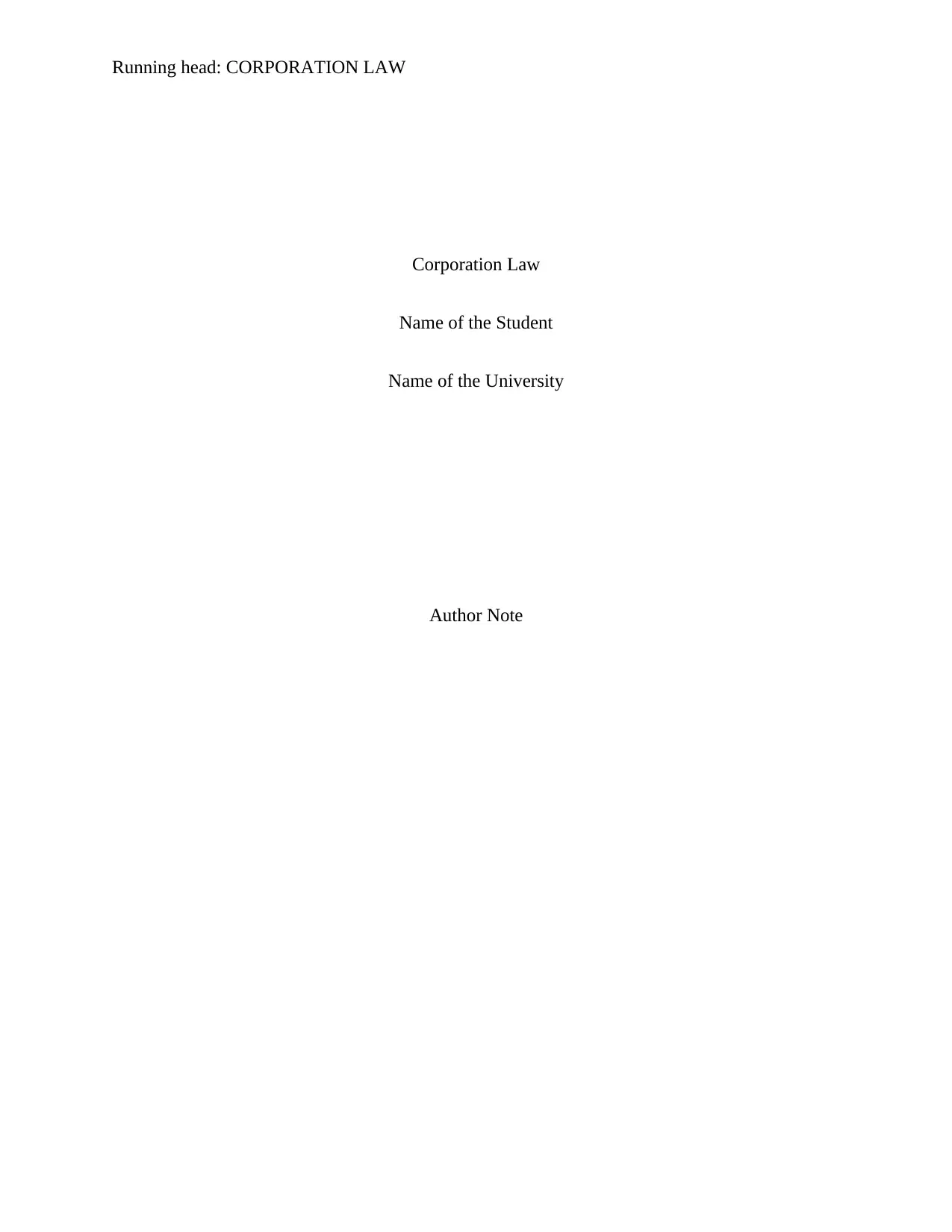
Running head: CORPORATION LAW
Corporation Law
Name of the Student
Name of the University
Author Note
Corporation Law
Name of the Student
Name of the University
Author Note
Paraphrase This Document
Need a fresh take? Get an instant paraphrase of this document with our AI Paraphraser
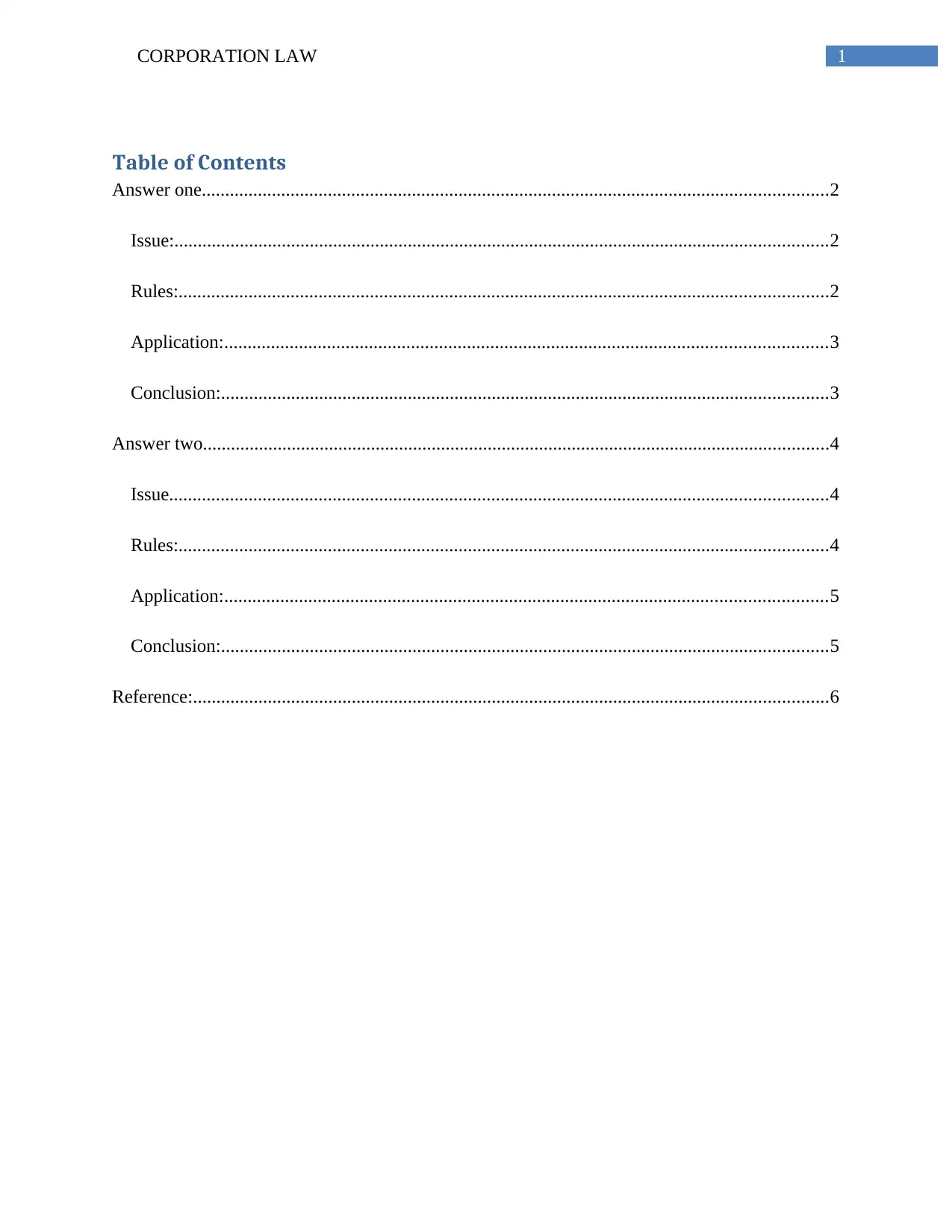
1CORPORATION LAW
Table of Contents
Answer one......................................................................................................................................2
Issue:............................................................................................................................................2
Rules:...........................................................................................................................................2
Application:.................................................................................................................................3
Conclusion:..................................................................................................................................3
Answer two......................................................................................................................................4
Issue.............................................................................................................................................4
Rules:...........................................................................................................................................4
Application:.................................................................................................................................5
Conclusion:..................................................................................................................................5
Reference:........................................................................................................................................6
Table of Contents
Answer one......................................................................................................................................2
Issue:............................................................................................................................................2
Rules:...........................................................................................................................................2
Application:.................................................................................................................................3
Conclusion:..................................................................................................................................3
Answer two......................................................................................................................................4
Issue.............................................................................................................................................4
Rules:...........................................................................................................................................4
Application:.................................................................................................................................5
Conclusion:..................................................................................................................................5
Reference:........................................................................................................................................6
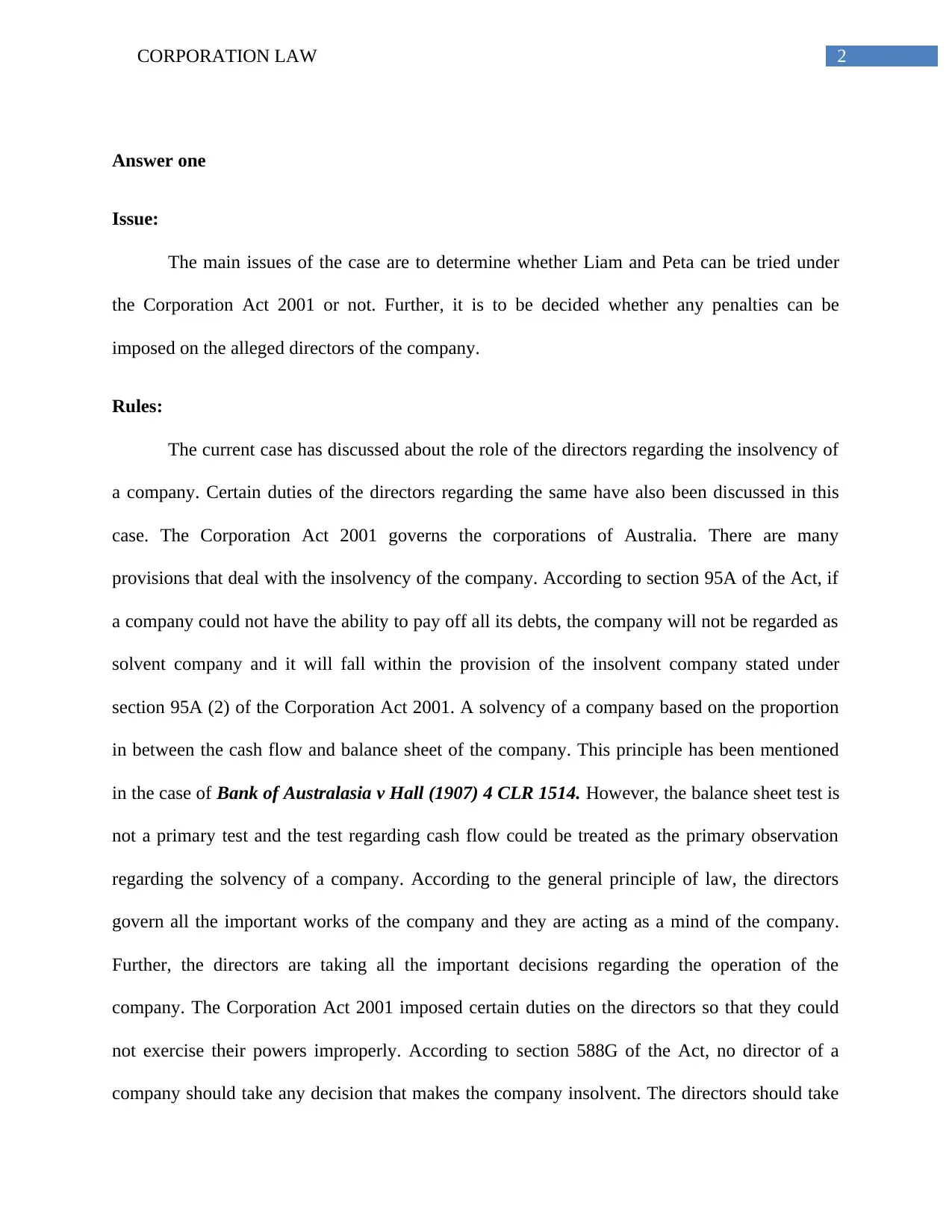
2CORPORATION LAW
Answer one
Issue:
The main issues of the case are to determine whether Liam and Peta can be tried under
the Corporation Act 2001 or not. Further, it is to be decided whether any penalties can be
imposed on the alleged directors of the company.
Rules:
The current case has discussed about the role of the directors regarding the insolvency of
a company. Certain duties of the directors regarding the same have also been discussed in this
case. The Corporation Act 2001 governs the corporations of Australia. There are many
provisions that deal with the insolvency of the company. According to section 95A of the Act, if
a company could not have the ability to pay off all its debts, the company will not be regarded as
solvent company and it will fall within the provision of the insolvent company stated under
section 95A (2) of the Corporation Act 2001. A solvency of a company based on the proportion
in between the cash flow and balance sheet of the company. This principle has been mentioned
in the case of Bank of Australasia v Hall (1907) 4 CLR 1514. However, the balance sheet test is
not a primary test and the test regarding cash flow could be treated as the primary observation
regarding the solvency of a company. According to the general principle of law, the directors
govern all the important works of the company and they are acting as a mind of the company.
Further, the directors are taking all the important decisions regarding the operation of the
company. The Corporation Act 2001 imposed certain duties on the directors so that they could
not exercise their powers improperly. According to section 588G of the Act, no director of a
company should take any decision that makes the company insolvent. The directors should take
Answer one
Issue:
The main issues of the case are to determine whether Liam and Peta can be tried under
the Corporation Act 2001 or not. Further, it is to be decided whether any penalties can be
imposed on the alleged directors of the company.
Rules:
The current case has discussed about the role of the directors regarding the insolvency of
a company. Certain duties of the directors regarding the same have also been discussed in this
case. The Corporation Act 2001 governs the corporations of Australia. There are many
provisions that deal with the insolvency of the company. According to section 95A of the Act, if
a company could not have the ability to pay off all its debts, the company will not be regarded as
solvent company and it will fall within the provision of the insolvent company stated under
section 95A (2) of the Corporation Act 2001. A solvency of a company based on the proportion
in between the cash flow and balance sheet of the company. This principle has been mentioned
in the case of Bank of Australasia v Hall (1907) 4 CLR 1514. However, the balance sheet test is
not a primary test and the test regarding cash flow could be treated as the primary observation
regarding the solvency of a company. According to the general principle of law, the directors
govern all the important works of the company and they are acting as a mind of the company.
Further, the directors are taking all the important decisions regarding the operation of the
company. The Corporation Act 2001 imposed certain duties on the directors so that they could
not exercise their powers improperly. According to section 588G of the Act, no director of a
company should take any decision that makes the company insolvent. The directors should take
⊘ This is a preview!⊘
Do you want full access?
Subscribe today to unlock all pages.

Trusted by 1+ million students worldwide
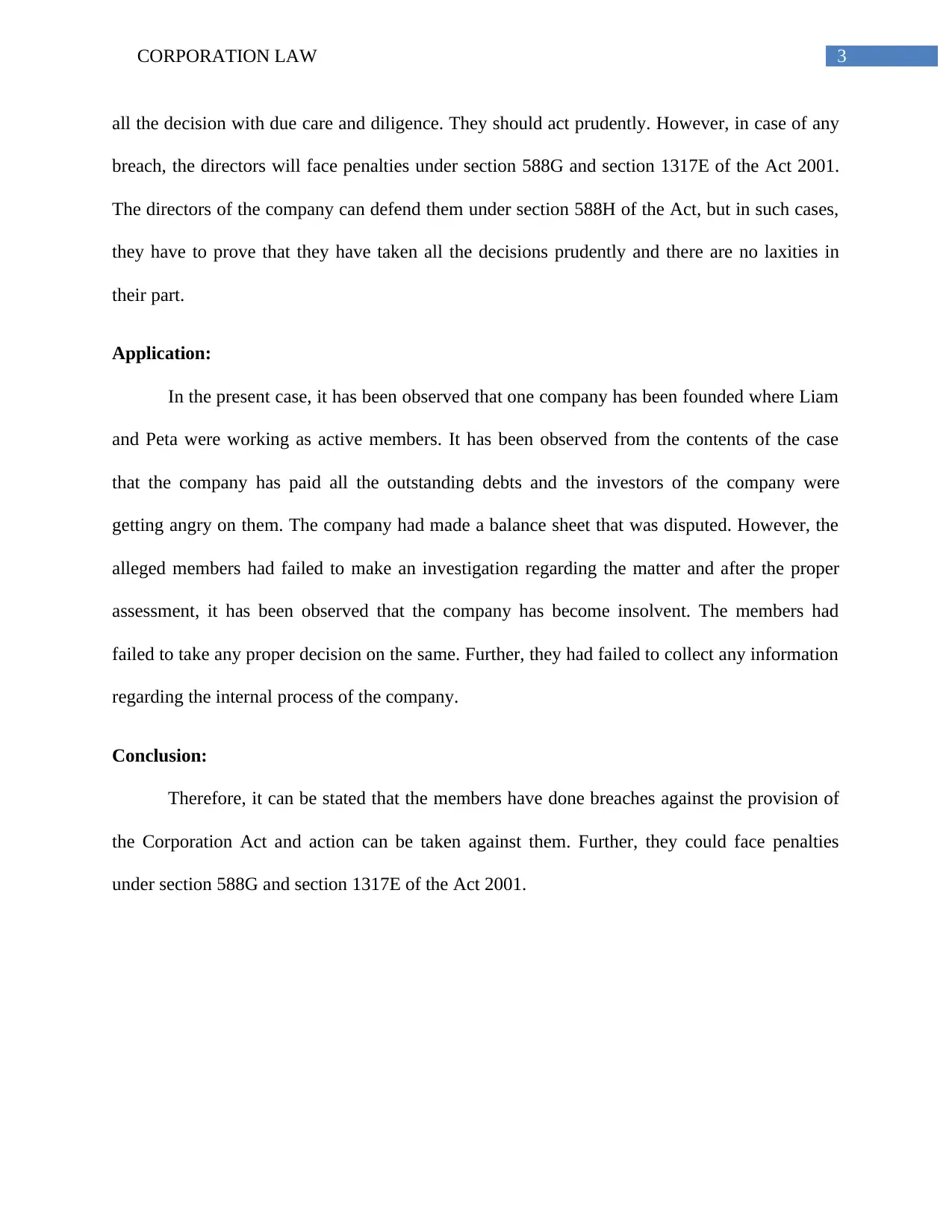
3CORPORATION LAW
all the decision with due care and diligence. They should act prudently. However, in case of any
breach, the directors will face penalties under section 588G and section 1317E of the Act 2001.
The directors of the company can defend them under section 588H of the Act, but in such cases,
they have to prove that they have taken all the decisions prudently and there are no laxities in
their part.
Application:
In the present case, it has been observed that one company has been founded where Liam
and Peta were working as active members. It has been observed from the contents of the case
that the company has paid all the outstanding debts and the investors of the company were
getting angry on them. The company had made a balance sheet that was disputed. However, the
alleged members had failed to make an investigation regarding the matter and after the proper
assessment, it has been observed that the company has become insolvent. The members had
failed to take any proper decision on the same. Further, they had failed to collect any information
regarding the internal process of the company.
Conclusion:
Therefore, it can be stated that the members have done breaches against the provision of
the Corporation Act and action can be taken against them. Further, they could face penalties
under section 588G and section 1317E of the Act 2001.
all the decision with due care and diligence. They should act prudently. However, in case of any
breach, the directors will face penalties under section 588G and section 1317E of the Act 2001.
The directors of the company can defend them under section 588H of the Act, but in such cases,
they have to prove that they have taken all the decisions prudently and there are no laxities in
their part.
Application:
In the present case, it has been observed that one company has been founded where Liam
and Peta were working as active members. It has been observed from the contents of the case
that the company has paid all the outstanding debts and the investors of the company were
getting angry on them. The company had made a balance sheet that was disputed. However, the
alleged members had failed to make an investigation regarding the matter and after the proper
assessment, it has been observed that the company has become insolvent. The members had
failed to take any proper decision on the same. Further, they had failed to collect any information
regarding the internal process of the company.
Conclusion:
Therefore, it can be stated that the members have done breaches against the provision of
the Corporation Act and action can be taken against them. Further, they could face penalties
under section 588G and section 1317E of the Act 2001.
Paraphrase This Document
Need a fresh take? Get an instant paraphrase of this document with our AI Paraphraser
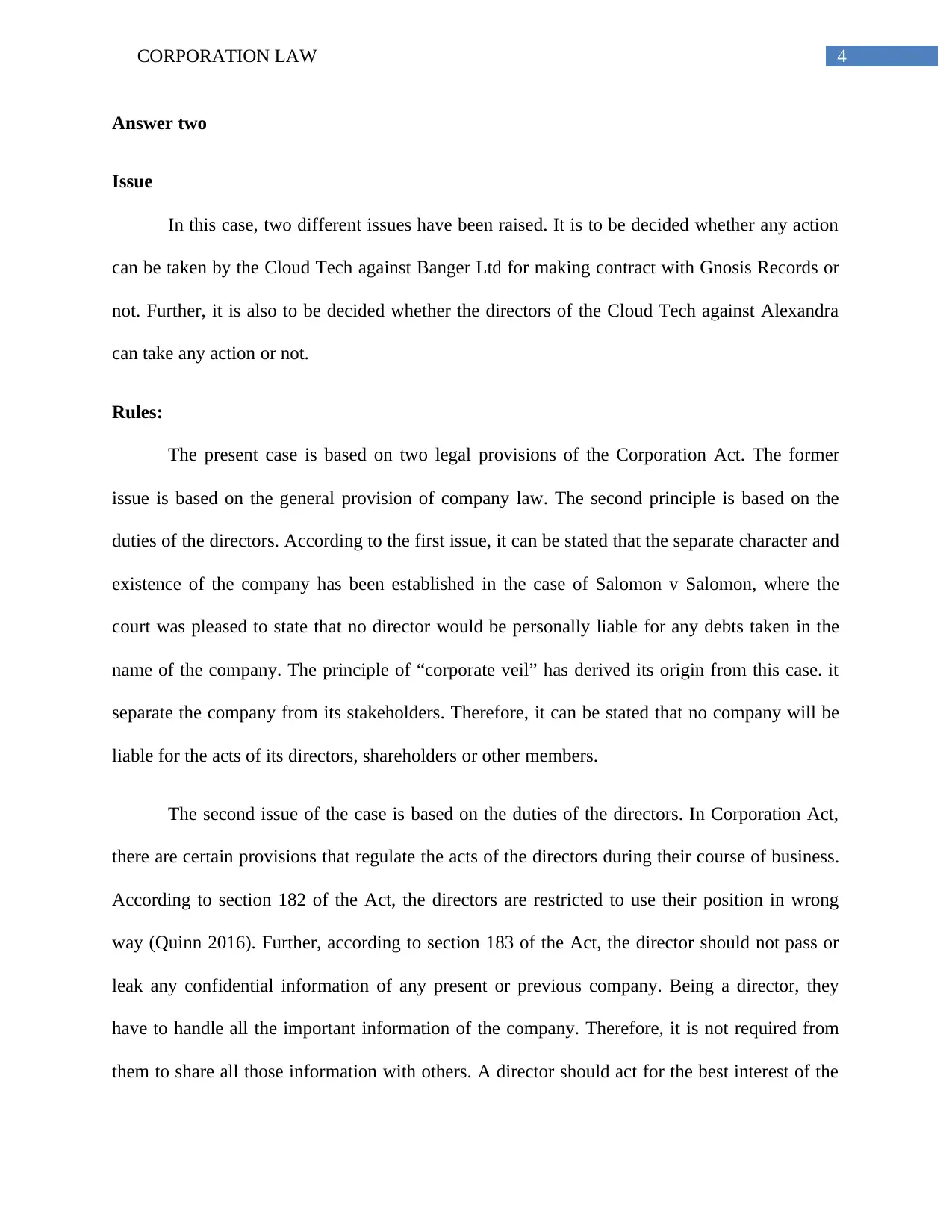
4CORPORATION LAW
Answer two
Issue
In this case, two different issues have been raised. It is to be decided whether any action
can be taken by the Cloud Tech against Banger Ltd for making contract with Gnosis Records or
not. Further, it is also to be decided whether the directors of the Cloud Tech against Alexandra
can take any action or not.
Rules:
The present case is based on two legal provisions of the Corporation Act. The former
issue is based on the general provision of company law. The second principle is based on the
duties of the directors. According to the first issue, it can be stated that the separate character and
existence of the company has been established in the case of Salomon v Salomon, where the
court was pleased to state that no director would be personally liable for any debts taken in the
name of the company. The principle of “corporate veil” has derived its origin from this case. it
separate the company from its stakeholders. Therefore, it can be stated that no company will be
liable for the acts of its directors, shareholders or other members.
The second issue of the case is based on the duties of the directors. In Corporation Act,
there are certain provisions that regulate the acts of the directors during their course of business.
According to section 182 of the Act, the directors are restricted to use their position in wrong
way (Quinn 2016). Further, according to section 183 of the Act, the director should not pass or
leak any confidential information of any present or previous company. Being a director, they
have to handle all the important information of the company. Therefore, it is not required from
them to share all those information with others. A director should act for the best interest of the
Answer two
Issue
In this case, two different issues have been raised. It is to be decided whether any action
can be taken by the Cloud Tech against Banger Ltd for making contract with Gnosis Records or
not. Further, it is also to be decided whether the directors of the Cloud Tech against Alexandra
can take any action or not.
Rules:
The present case is based on two legal provisions of the Corporation Act. The former
issue is based on the general provision of company law. The second principle is based on the
duties of the directors. According to the first issue, it can be stated that the separate character and
existence of the company has been established in the case of Salomon v Salomon, where the
court was pleased to state that no director would be personally liable for any debts taken in the
name of the company. The principle of “corporate veil” has derived its origin from this case. it
separate the company from its stakeholders. Therefore, it can be stated that no company will be
liable for the acts of its directors, shareholders or other members.
The second issue of the case is based on the duties of the directors. In Corporation Act,
there are certain provisions that regulate the acts of the directors during their course of business.
According to section 182 of the Act, the directors are restricted to use their position in wrong
way (Quinn 2016). Further, according to section 183 of the Act, the director should not pass or
leak any confidential information of any present or previous company. Being a director, they
have to handle all the important information of the company. Therefore, it is not required from
them to share all those information with others. A director should act for the best interest of the
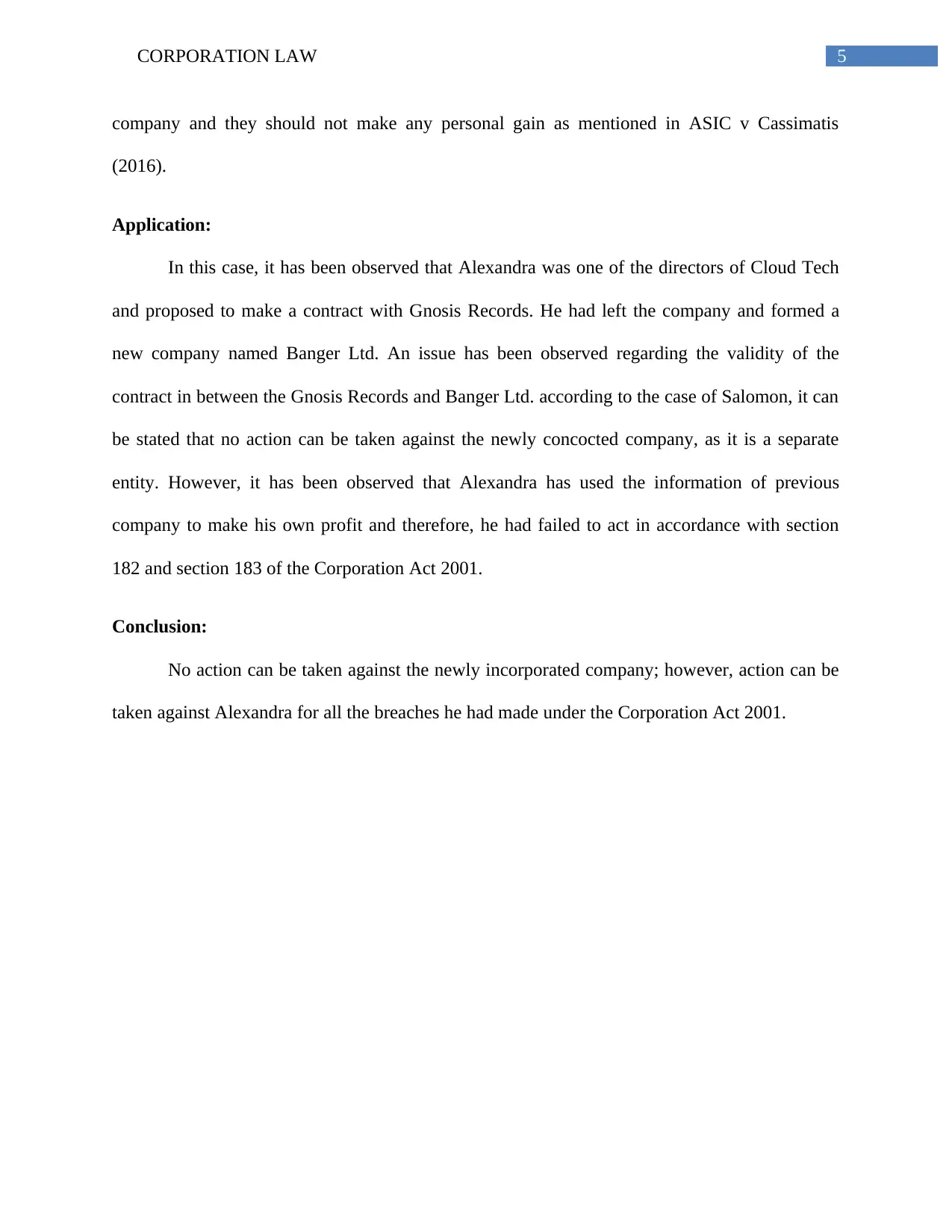
5CORPORATION LAW
company and they should not make any personal gain as mentioned in ASIC v Cassimatis
(2016).
Application:
In this case, it has been observed that Alexandra was one of the directors of Cloud Tech
and proposed to make a contract with Gnosis Records. He had left the company and formed a
new company named Banger Ltd. An issue has been observed regarding the validity of the
contract in between the Gnosis Records and Banger Ltd. according to the case of Salomon, it can
be stated that no action can be taken against the newly concocted company, as it is a separate
entity. However, it has been observed that Alexandra has used the information of previous
company to make his own profit and therefore, he had failed to act in accordance with section
182 and section 183 of the Corporation Act 2001.
Conclusion:
No action can be taken against the newly incorporated company; however, action can be
taken against Alexandra for all the breaches he had made under the Corporation Act 2001.
company and they should not make any personal gain as mentioned in ASIC v Cassimatis
(2016).
Application:
In this case, it has been observed that Alexandra was one of the directors of Cloud Tech
and proposed to make a contract with Gnosis Records. He had left the company and formed a
new company named Banger Ltd. An issue has been observed regarding the validity of the
contract in between the Gnosis Records and Banger Ltd. according to the case of Salomon, it can
be stated that no action can be taken against the newly concocted company, as it is a separate
entity. However, it has been observed that Alexandra has used the information of previous
company to make his own profit and therefore, he had failed to act in accordance with section
182 and section 183 of the Corporation Act 2001.
Conclusion:
No action can be taken against the newly incorporated company; however, action can be
taken against Alexandra for all the breaches he had made under the Corporation Act 2001.
⊘ This is a preview!⊘
Do you want full access?
Subscribe today to unlock all pages.

Trusted by 1+ million students worldwide
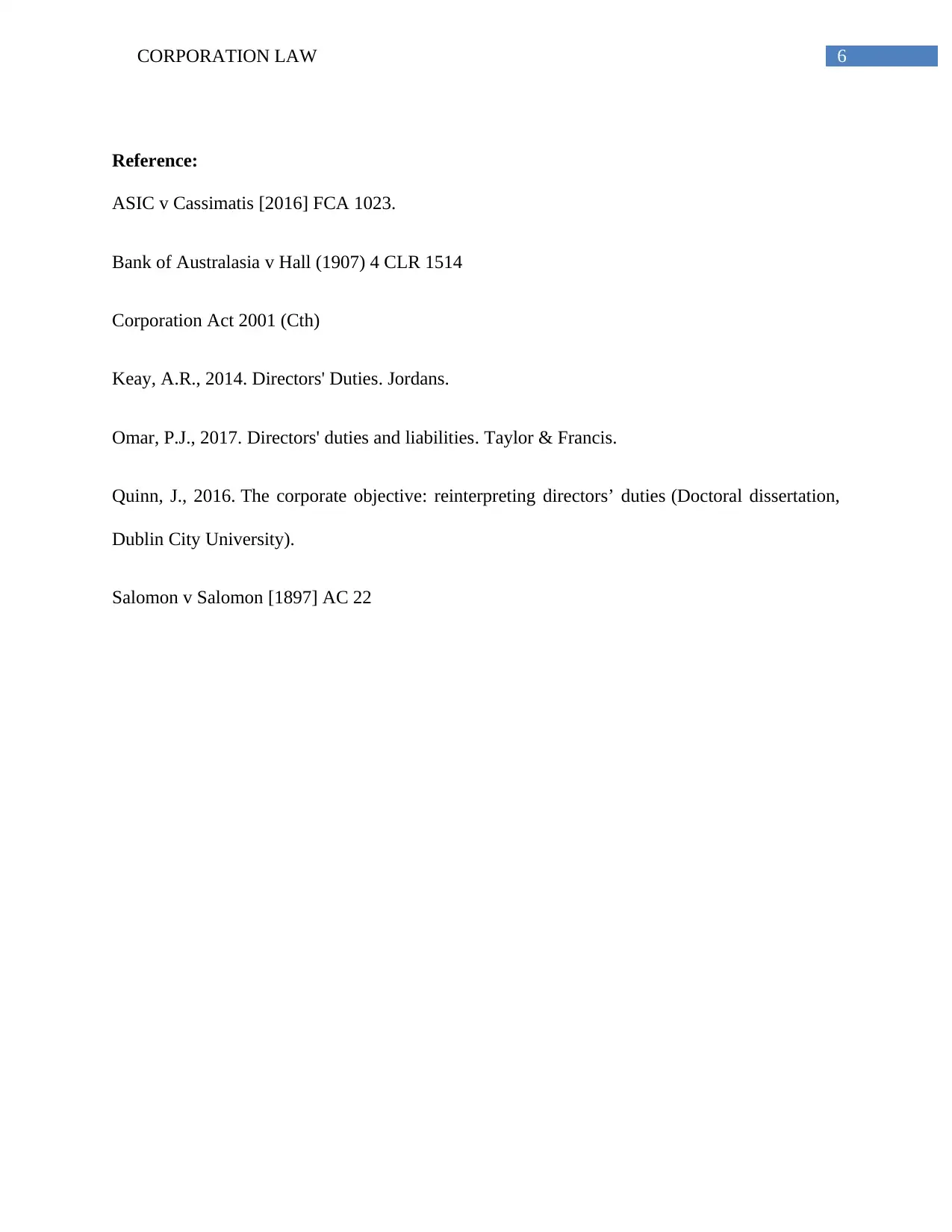
6CORPORATION LAW
Reference:
ASIC v Cassimatis [2016] FCA 1023.
Bank of Australasia v Hall (1907) 4 CLR 1514
Corporation Act 2001 (Cth)
Keay, A.R., 2014. Directors' Duties. Jordans.
Omar, P.J., 2017. Directors' duties and liabilities. Taylor & Francis.
Quinn, J., 2016. The corporate objective: reinterpreting directors’ duties (Doctoral dissertation,
Dublin City University).
Salomon v Salomon [1897] AC 22
Reference:
ASIC v Cassimatis [2016] FCA 1023.
Bank of Australasia v Hall (1907) 4 CLR 1514
Corporation Act 2001 (Cth)
Keay, A.R., 2014. Directors' Duties. Jordans.
Omar, P.J., 2017. Directors' duties and liabilities. Taylor & Francis.
Quinn, J., 2016. The corporate objective: reinterpreting directors’ duties (Doctoral dissertation,
Dublin City University).
Salomon v Salomon [1897] AC 22
1 out of 7
Related Documents
Your All-in-One AI-Powered Toolkit for Academic Success.
+13062052269
info@desklib.com
Available 24*7 on WhatsApp / Email
![[object Object]](/_next/static/media/star-bottom.7253800d.svg)
Unlock your academic potential
Copyright © 2020–2026 A2Z Services. All Rights Reserved. Developed and managed by ZUCOL.




